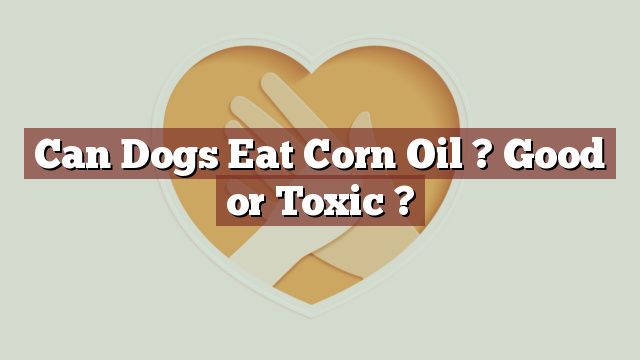Can Dogs Eat Corn Oil? Good or Toxic?
Knowing what foods are safe for our dogs to consume is crucial in ensuring their overall health and well-being. While some human foods can be toxic to our canine companions, others can provide nutritional benefits. In this article, we will delve into the topic of whether dogs can eat corn oil and explore its potential risks and benefits.
Nutritional Value of Corn Oil for Dogs: A Detailed Analysis
Corn oil is extracted from the germ of corn kernels and is commonly used in cooking and food preparation. It is rich in unsaturated fats, including omega-6 fatty acids, which play a vital role in maintaining a healthy coat and skin for dogs. Additionally, corn oil is a good source of vitamin E, a powerful antioxidant that supports immune function and helps protect cells from damage.
Can Dogs Eat Corn Oil? Safety and Toxicity Explained
Can dogs eat corn oil? The answer is yes, dogs can consume corn oil in moderation without experiencing any immediate harm. However, it is essential to note that excessive consumption can lead to gastrointestinal upset, including diarrhea and pancreatitis. Therefore, it is crucial to use corn oil sparingly and consult with a veterinarian before incorporating it into your dog’s diet.
Some scientific studies have shown that an imbalanced ratio of omega-6 to omega-3 fatty acids can contribute to inflammation and other health issues in dogs. Since corn oil is high in omega-6 fatty acids and low in omega-3s, it is recommended to use it in conjunction with other oils or fats that have a more balanced fatty acid profile.
Potential Risks and Benefits of Corn Oil for Canines
While corn oil can provide some health benefits for dogs, it also poses potential risks. As mentioned earlier, excessive consumption can lead to gastrointestinal upset and pancreatitis. Additionally, corn oil is calorie-dense and can contribute to weight gain if not portioned appropriately, which can lead to obesity and related health problems in dogs.
On the other hand, the omega-6 fatty acids present in corn oil can help maintain a healthy skin and coat, reducing dryness and itchiness in dogs. The vitamin E content in corn oil also supports immune function and may aid in the prevention of certain diseases.
What to Do if Your Dog Eats Corn Oil: Steps to Take
If your dog accidentally consumes corn oil or exhibits any adverse reactions after ingestion, it is important to take appropriate steps. If your dog exhibits severe symptoms or you are unsure about the quantity consumed, it is best to contact your veterinarian immediately for guidance.
In cases of mild gastrointestinal upset, it is recommended to withhold food for a few hours to allow the digestive system to settle. Offer small amounts of water frequently to prevent dehydration. If symptoms persist or worsen, consult your veterinarian for a thorough evaluation and appropriate treatment.
Conclusion: Corn Oil in Moderation Can Be Safe for Dogs
In conclusion, dogs can eat corn oil in moderation without experiencing any immediate harm. It is important to be mindful of portion sizes and to consult with a veterinarian before introducing corn oil or any other new food into your dog’s diet. While it can provide certain nutritional benefits, excessive consumption can lead to gastrointestinal upset and other health issues. Remember to monitor your dog’s overall well-being and seek veterinary advice if any concerning symptoms arise.
Thank you for investing your time in exploring [page_title] on Can-Eat.org. Our goal is to provide readers like you with thorough and reliable information about various dietary topics. Each article, including [page_title], stems from diligent research and a passion for understanding the nuances of our food choices. We believe that knowledge is a vital step towards making informed and healthy decisions. However, while "[page_title]" sheds light on its specific topic, it's crucial to remember that everyone's body reacts differently to foods and dietary changes. What might be beneficial for one person could have different effects on another. Before you consider integrating suggestions or insights from "[page_title]" into your diet, it's always wise to consult with a nutritionist or healthcare professional. Their specialized knowledge ensures that you're making choices best suited to your individual health needs. As you navigate [page_title], be mindful of potential allergies, intolerances, or unique dietary requirements you may have. No singular article can capture the vast diversity of human health, and individualized guidance is invaluable. The content provided in [page_title] serves as a general guide. It is not, by any means, a substitute for personalized medical or nutritional advice. Your health should always be the top priority, and professional guidance is the best path forward. In your journey towards a balanced and nutritious lifestyle, we hope that [page_title] serves as a helpful stepping stone. Remember, informed decisions lead to healthier outcomes. Thank you for trusting Can-Eat.org. Continue exploring, learning, and prioritizing your health. Cheers to a well-informed and healthier future!

